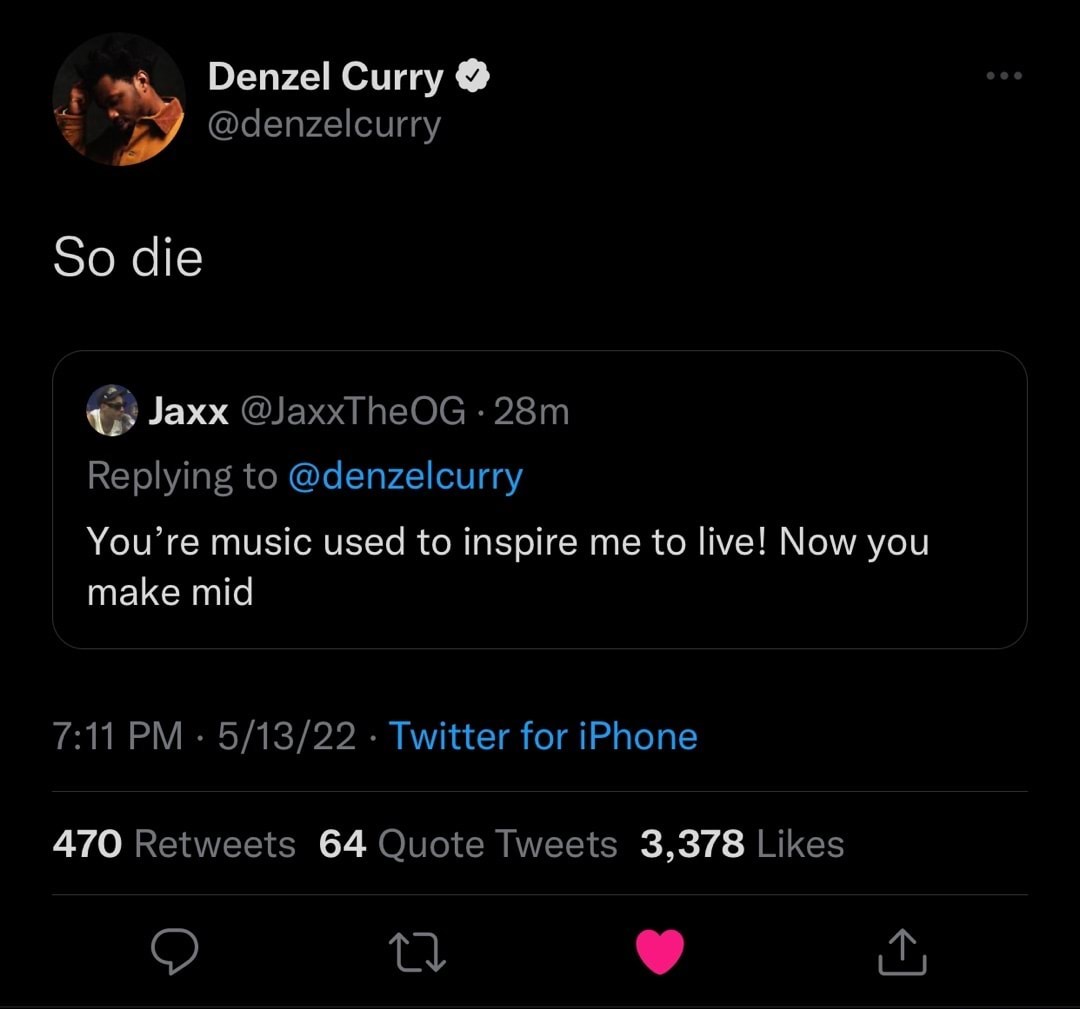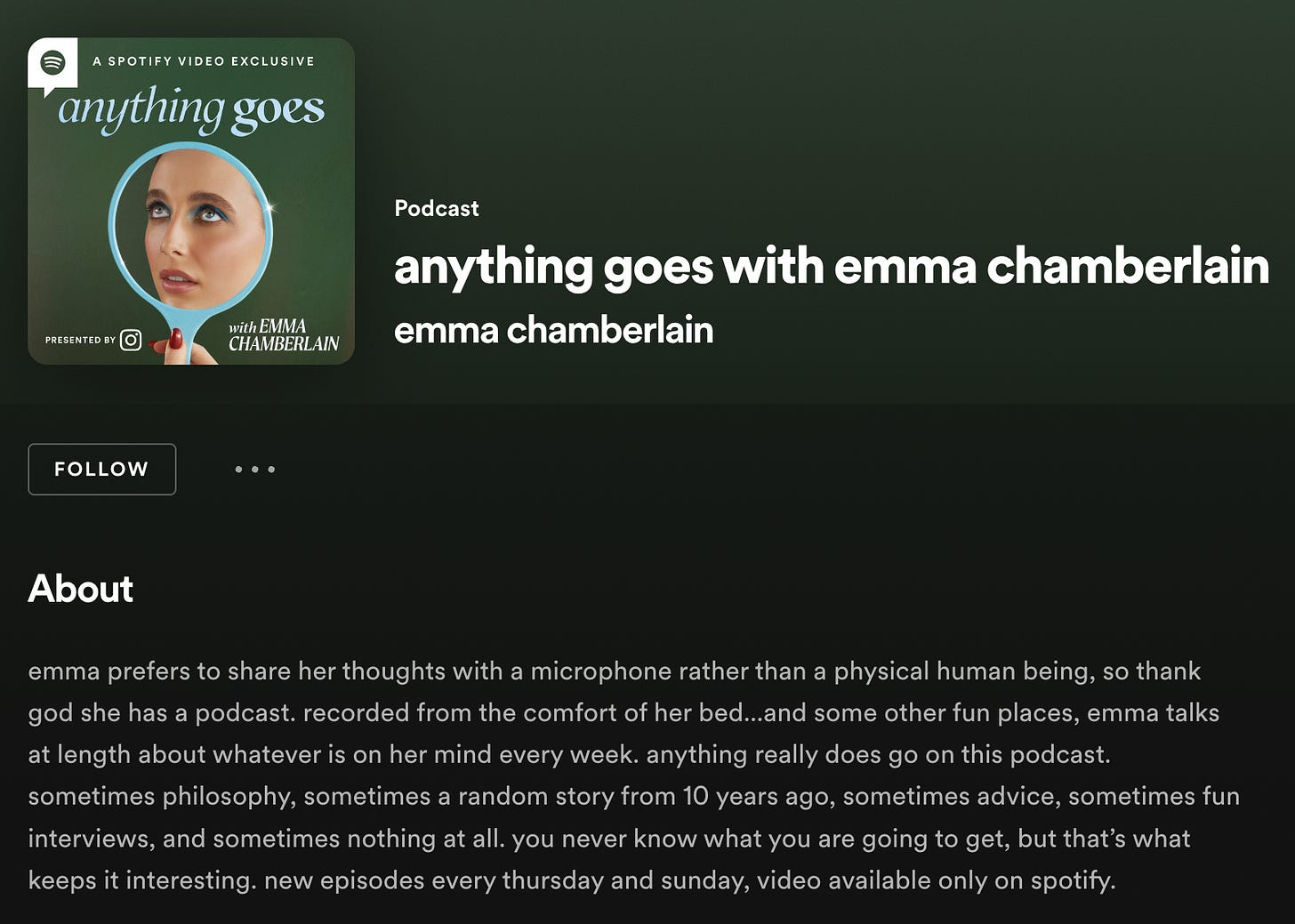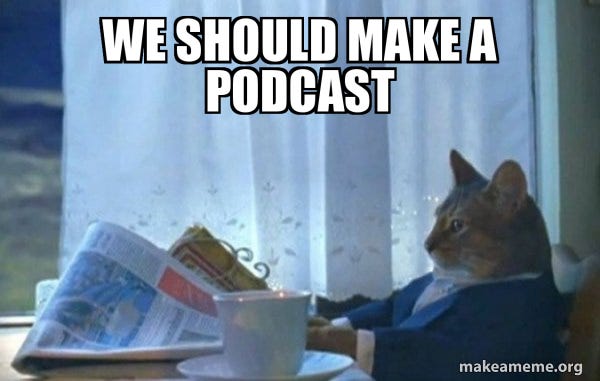
Most people with audiences are afraid of them. Many without audiences feel burdened to pursue one.
It’s an unavoidable piece of professional life in the modern era. You have to be online to network. You have to market. And you also probably use social media in your personal life, seamlessly blending work and play.
So how are you supposed to put yourself out there?
Is social media a place to promote your work, or a place to express who you are?
Can you tell the difference between the two?
Value
Social media has a psychological effect on us (individually and culturally) that makes it hard to understand exactly what values we are pursuing moment to moment. There is a flattening that takes place when you go to one app and endlessly scroll, experiencing your news with your memes, your political discourse with your celebrity gossip, updates from friends alongside their attempts at virality.
The flattening often leads to wildly successful content creators that aren’t exactly sure what their job is.
When trying to figure out your job, you might instinctively think about money. How do you get paid? Who pays you? There’s your job. But you can also take the metaphysical approach. Money is supposed to be a representative of value. So, disregarding money, what value do you provide?
Your real job is to provide a Good or a Service. To do something of value to your society. Creating something Good or Serving another human being is much more intrinsic than whatever modern monetary system is superimposed on top of it.
To participate in culture and community, we must contribute. In some form or another, a healthy citizen gives and receives gifts in a reciprocal relationship with others. This is how we find meaning in our lives.
What gives us identity and individuality is what community we belong to, who we contribute to, and what specific gift we specialize in giving.
We don’t gain our identities by extremely general qualities. I (CJ, author) am a YouTuber, so in some sense I am in community with Mr. Beast. However, I have very little meaningfully in common with Mr. Beast, because merely using the same massive tool to make our money is not a specific description of the Goods and Services we provide. It’s merely a description of the mechanism by which we distribute and profit.
When you take away the delivery medium and the technicalities of monetization, the specific service you actually provide is a little slippery to pin down.
The creation of a Good or the provision of a Service are the generation of Value itself.
Value is the subjectivity that drives all objectivity. Difficult to analytically define, but the inevitable answer to every question of “Why?”.
When figuring out what your job is, I implore you to look deeper than how you make your money. Look beneath the technicality. Ask why, and what, specifically.
What value do you provide?
Parasociality
The “parasocial relationship” was introduced into our lexicon by sociologists Donald Horton and Richard Wohl in response to the phenomena of home television sets.
As daily entertainment broadcasting entered homes, it brought with it a wave of new celebrities, who instead of appearing in glamorized spectacular contexts, appear as personal and familiar to their audiences.
These personae provide a different service than the traditional celebrity. Rather than be valued for their talents and products, these personae are valued as intimate friends.
The spectacular fact about such personae is that they can claim and achieve an intimacy with what are literally crowds of strangers, and this intimacy, even if it is an imitation and a shadow of what is ordinarily meant by that word, is extremely influential with, and satisfying for, the great numbers who willingly receive it and share in it. They “know” such a persona in somewhat the same way they know their chosen friends: through direct observation and interpretation of his appearance, his gestures and voice, his conversation and conduct in a variety of situations. Indeed, those who make up his audience are invited, by designed informality, to make precisely these evaluations—to consider that they are involved in a face-to-face exchange rather than in passive observation.
The term gained exponential momentum over the last decade as social media became ubiquitous, magnifying the parasocial relationship effect far beyond the likes of radio show hosts and television personalities.
Now anyone with a phone and WiFi connection is at risk of becoming a micro-celebrity, and there are far less barriers between them and their audience. Horton and Wohl were concerned with call-in radio and game show hosts, who still required a network to produce and broadcast their programs. They were concerned about a corporate team manufacturing a parasocial relationship for profit. But today, someone can stumble into parasociality without any awareness that it is even happening.
Views are views. Fans are fans. Money is money.
When the engagement is flowing, it’s not particularly important why it’s flowing.
Getting attention and forming a relationship with an audience is not a bad thing.
However it is very important to know what kind of attention you are getting.
Emma Chamberlain Has A Podcast
Emma Chamberlain is an internet persona, influencer, and parasocial bestie to millions. She also has a podcast.
And I have nothing against her! But her podcast pitch is the antithesis of everything I believe in, which is fun.

“emma talks at length about whatever is on her mind every week. anything really does go on this podcast. sometimes philosophy, sometimes a random story from 10 years ago, sometimes advice, sometimes fun interviews, and sometimes nothing at all.”
Literally offering you “nothing”.
Nothing except for Emma’s reliable presence in your life.
Chamberlain is a beautiful and charismatic person. I’m not surprised that people are interested in her.
However she is very transparently offering an explicitly parasocial service.
This isn’t a beautiful intelligent charismatic person performing any particular feat, but simply existing in your space twice a week for you to gawk at and experience as faux company.
On the parasocial performer-audience relationship spectrum, this is the extreme far end, where one simply relinquishes responsibility to any particular service except showing up and being themselves.
That sounds nice on some level! Just show up and be yourself!
Be a friend to millions of people! No crew, no script, just be their chill friend.
However this is an illusion. You are not really their friend. You can’t be.
What you are actually doing is cultivating a one sided relationship. Inducing an illusion of comfort and intimacy and attachment, encouraging the audience to rely on you and consider you part of their pseudo social life.
This will be an unavoidable and completely natural component of building any audience, interfacing with any large group of people. I would only urge people to be aware of what service they are providing, and if they are okay with that.
There’s something very sad about Chamberlain’s career, a vagueness to her value that robs her of identity and dignity.
She blew up online with relatable, quirky vlogs, but as that content has gone a bit out of fashion and she’s increased in profile she has been trying to transition into something more tangible. She has been tremendously successful, branching out into podcasting, modelling, interviews, collaborations with Vogue, GQ, and Coachella, she runs a business selling her own coffee, and she’s altered her Youtube content to documentary style travel vlogs. But it’s still nearly impossible to state what her actual job is.
You can call her a YouTuber, a podcaster, an influencer, but those are just descriptions of how she makes her money, where she puts the things that she creates. Is she a comedian? A model? An interviewer? A philosopher? A businesswoman? She sometimes gestures towards these roles, but cannot be said to specialize in any of them as an actual craft.
This leads to uncomfortable moments like the first few minutes of her appearance on The Tonight Show with Jimmy Fallon.
J: First off, for those who don’t know, can you explain what you do?
e: That’s, like, the hardest question for me… I think what I do is I just like, put things on the internet and go like this *crosses fingers*
J: But, I mean, Youtube videos, and you just… what’s the secret? Why do people just love you?
e: I like, truly don’t know.
This is obviously played for laughs in peak casual relatable quirky form, but when you consider the reality of this exchange it’s a little bleak.
Where is the pride in one’s work? The dignity of a job title?
I (CJ, author) am a YouTuber. But in actuality I am a writer, a philosopher, and an artist. YouTube is the place I express that, with a burning a spotlight on my personality appropriate to the medium. And that’s just fine! I hope my personality is attractive, I hope I am funny and sexy and relatable, but being an attractive personality is an ornament upon my work as a researcher, writer, comedian, artist, etc.
I worry many people are thoughtlessly vaulting their lives online, implicitly submerging themselves in the mythology of personality worship, often unable to name what service they even seek to provide.
Having an attractive personality is a great quality. But it isn’t a job. When you try to distill it into a career, it looks like imprisonment in an exploitative cycle of selling selfhood. Cultivating parasocial relationships and cashing in on them by doing mass marketing for corporate partners.
Even her own coffee brand is run by venture capital and opportunistic executives, while she is relegated to picking out cute names and colours to go sell on the Jimmy Fallon show (after failing to explain what her job is and reacting to clips of herself at the Met Gala [brought to you by Vogue magazine]).
I sincerely wish Chamberlain the best. I am as bewitched as anyone else by her looks and charm. But her career is not aspirational or instructive. It’s a dehumanizing lottery of selfhood, where your only monetizable asset is an illusory one sided relationship and a cult of personality, optioned for sale to corporate interests that want to exploit people’s parasocial interest in you.
In a grotesque exaggeration of Horton and Wohl’s initial critique, there isn’t even a show working around the personae to conceal the parasocial service. No game show, no subject matter, no identity. There is no “private life away from the show.” The private life IS the show.
The Show Must Go On

There’s a cliche in my generation where everyone thinks they should start a podcast. Many harbour the secret suspicion that if we simply recorded our hilarious and insightful conversations with our friends, we could outdo the pros and get micro-famous.
It’s no surprise this spectre haunts our collective consciousness, as we are beset on all sides by parasocial besties. It feels within reach, that just existing with enough effervescent grace and whimsy is to accrue an audience, and be celebrated.
The fantasy of parasocial fame is that Being The Right Person makes you famous. You can create a whole community based off of your general vibes. This kind of success is incredibly rare, and where it exists it is undesirable.

Parasociality brings a host of curses that are impossible to shake. The overfamiliarity bites back, as fandoms are emboldened with invasive possessive feelings over your being that can sharply invert from obsessive worship to obsessive hatred stemming from the same source of glitchy shadow intimacy. As many influencers grow up and their interests pivot, their parasocial fandom will resent them for changing. And as previously mentioned, you are relegated to the role of influencer, earning money by remaining likeable and promoting other people’s products to your adoring audience. This isn’t even touching on the psychological toll it must take on the creator, whose sense of self worth and identity is dominated by this slippery transaction. Nor the unsuccessful parasocial performer, who can only come to the conclusion that they are somehow unlikeable or less valuable than those who are intimately adored by their audiences.
There is a better option.
Redeeming Performance
Being loved for who you are, regardless of the quality or nature of your performance, is very important for human beings. This is love. This is intimacy.
But love and intimacy comes from people you actually know. It comes from friends and family and partners. And such sacred things do not exist for profit.
When it comes to the public sphere, culture, commerce, the realm of Goods and Services, it is better to be admired for what you do.
If you’re sincerely trying to create value for the world, you don’t want an audience to be populated by sympathetic friends and supportive family members. You want an audience of people who adore the work.
You don’t want people to be fans of what you create because they are fans of you. You want them to be fans of you because of what you create.
The parasocial element is a natural and inevitable consequence of such a thing, but you are in control of how you define yourself. Don’t let your pitch be “anything goes.” BE something. Select a specific value and pursue it. Be a podcaster with a show about something other than yourself.
And just like that, identity forms. An identity is based in the work. There is something to hold onto that is not raw egotistic parasocial indulgence.
All of that, with just a simple statement of intent.
This difference may seem subtle and frivolous, but it is not.
The Trinity of Creativity

This is not just advice for people who are micro-famous. This is not just advice for YouTubers. This is for anyone who wants to make anything, ever, for other people.
You are not in control of what people get out of your performance. Maybe people will value you parasocially more than they respect your work, maybe they’ll like your work and dislike your personality, or maybe they won’t like what you do at all.
What you are in control of is what you choose to care about. What you choose to pour your energy into. You are in control of where you direct your attention.
The power of perceiving reality as a performance is how it moves the focus away from yourself, away from others, to a secret third thing. There is you, there is the audience, and there is The Performance. The Show. The Value.
Parasociality subordinates The Performance underneath the Self. But this kind of self centered conception of reality flies in the face of all of our oldest wisdom: Don’t live to please others. Don’t live to worship yourself. Live for something bigger than yourself.
We don’t exist in some illusory subjective world of individual selfish impulsivity. This is not all about you. It’s also not all about sacrificing your sincerity and individualism to serve others. That will burn you out and strip your soul of its dignity, it will prevent you from providing the value that only you and your passion can provide, and on top of that you will never succeed at serving everyone else all the time.
So you must choose who and what you will serve. You must listen to what calls to you, and respond to that call. Not because you selfishly want to, not because you are required to, but because you have been implanted with the most valuable asset that exists in this life: Passion, for something specific.
It doesn’t need to be a single thing, forever and ever. The only single things that are sensical to worship forever are highly Dynamic Truths, like God, or Allah, or the Tao. And the reason these things can be worshipped is specifically because of their mystical, ever changing, all encompassing nature. They are healthy to hold above all else.
But as you move through life, you must pick minor deities to worship as well. Smaller, more specific values to commit yourself to. This is the act of creating a Good or a Service.
This will involve assessing your passions, your personality, and your gifts. This will involve selecting a specific kind of person that you wish to serve. But when it comes down to it, it will involve some submersion in worship of a mystic dynamic value in between those two things. You make the show for you, you make the show for others, but most importantly, you make the show For The Show.
Everyone who has experienced meaningful creativity is aware of this vivid state of consciousness. Flow state removes your sense of self, immersing you entirely in the value outside of you. Audiences adore this strange sense of something being created by someone in a fit of passion, but somehow magically being designed for the audience simultaneously. When you place the role of value outside of the self, in some space that subsumes both performer and audience, humanity thrives.
This is the mindframe that unlocks the creative process. This is the attitude that paradoxically allows you and the audience to have the healthiest, most fulfilling relationship possible, perfectly tuned to your mutual sensibilities.
Be Yourself, Honour The Audience, Worship The Work.
As David Foster Wallace bluntly put it in his famous commencement speech:
Not that that mystical stuff is necessarily true. The only thing that’s capital-T True is that you get to decide how you’re gonna try to see it… You get to decide what to worship.
This is Water, David Foster Wallace, 2005
